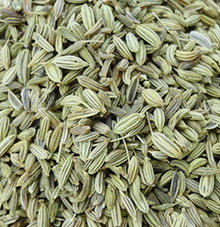Fennel is a perennial, pleasant-smelling herb with yellow flowers. It is native to the Mediterranean, but is now found throughout the world. Dried fennel seeds are often used in cooking as an anise-flavored spice. But don’t confuse fennel with anise; though they look and taste similar, they are not the same. Fennel’s dried ripe seeds and oil are used to make medicine.
Contents
Uses
- Fennel is used for various digestive problems including heartburn, intestinal gas,bloating, loss of appetite, and colic in infants. It is also used for upper respiratory tract infections, coughs, bronchitis, cholera, backache, bedwetting, and visual problems.
- Some women use fennel for increasing the flow of breast milk, promotingmenstruation, easing the birthing process, and increasing sex drive.
- Fennel powder is used as a poultice for snakebites.
- In foods and beverages, fennel oil is used as a flavoring agent.
- In other manufacturing processes, fennel oil is used as a flavoring agent in certainlaxatives, and as a fragrance component in soaps and cosmetics.
Benefits
- Fennel might relax the colon and decrease respiratory tract secretions.
Cautions
- Fennel is LIKELY SAFE when taken by mouth in the amounts commonly found in food. For the most part, there is not enough evidence to know whether it is safe for adults when used in medicinal amounts.
- Some people can have allergic skin reactions to fennel. People who are allergic to plants such as celery, carrot, and mugwort are more likely to also be allergic to fennel. Fennel can also make skin extra sensitive to sunlight and make it easier to get a sunburn. Wear sunblock if you are light-skinned.
Not enough is known about the safety of using fennel during pregnancy. It’s best to avoid use. - During breast-feeding, fennel is POSSIBLY UNSAFE. It’s been reported that two breast-feeding infants experienced damage to their nervous systems after their mothers drank an herbal tea that contained fennel.
- Children: For the most part, there is not enough evidence to know whether it is safe for children when used in medicinal amounts. However, researchers have studied a combination product (ColiMil) for colic that contains fennel, lemon balm, and German chamomile. This product seems to be safe in infants when used for up to one week.
- Allergy to celery, carrot or mugwort: Fennel might cause an allergic reaction in people who are sensitive to these plants.
- Bleeding disorders: Fennel might slow blood clotting. Taking fennel might increase the risk of bleeding or bruising in people with bleeding disorders.
- Hormone-sensitive condition such as breast cancer, uterine cancer, ovarian cancer, endometriosis, or uterine fibroids: Fennel might act like estrogen. If you have any condition that might be made worse by exposure to estrogen, do not use fennel.
Interactions
Moderate Interaction Be cautious with this combination
- Birth control pills (Contraceptive drugs) interacts with FENNEL: Some birth control pills contain estrogen. Fennel might have some of the same effects as estrogen. But fennel isn’t as strong as the estrogen in birth control pills. Taking fennel along with birth control pills might decrease the effectiveness of birth control pills. If you take birth control pills along with fennel, use an additional form of birth control such as a condom.
- Some birth control pills include ethinyl estradiol and levonorgestrel (Triphasil), ethinyl estradiol and norethindrone (Ortho-Novum 1/35, Ortho-Novum 7/7/7), and others.
- Ciprofloxacin (Cipro) interacts with FENNEL: Ciprofloxacin (Cipro) is an antibiotic. Fennel might decrease how much ciprofloxacin (Cipro) the body absorbs. Taking fennel along with ciprofloxacin (Cipro) might decrease the effectiveness of ciprofloxacin (Cipro). To avoid this interaction take fennel at least one hour after ciprofloxacin (Cipro).
- Estrogens interacts with FENNEL: Large amounts of fennel might have some of the same effects as estrogen. But fennel isn’t as strong as estrogen pills. Taking fennel along with estrogen pills might decrease the effects of estrogen pills.
- Some estrogen pills include conjugated equine estrogens (Premarin), ethinyl estradiol, estradiol, and others.
- Tamoxifen (Nolvadex) interacts with FENNEL: Some types of cancer are affected by hormones in the body. Estrogen-sensitive cancers are cancers that are affected by estrogen levels in the body. Tamoxifen (Nolvadex) is used to help treat and prevent these types of cancer. Fennel seems to also affect estrogen levels in the body. Taking fennel along with tamoxifen might decrease the effectiveness of tamoxifen (Nolvadex). Do not take fennel if you are taking tamoxifen (Nolvadex).
Other Names
Anethum Foeniculum, Anethum piperitum, Bari-Sanuf, Bitter Fennel, Carosella, Common Fennel, Fennel Essential Oil, Fennel Oil, Fennel Seed, Fenouil, Fenouil Amer, Fenouil Bulbeux, Fenouil Commun, Fenouil de Florence, Fenouil des Vignes, Fenouil Doux, Fenouil Sauvage, Finnochio, Florence Fennel, Foeniculi Antheroleum, Foeniculum Capillaceum, Foeniculum Officinale, Foeniculum piperitum, Foeniculum Vulgare, Foeniculum Vulgare Fruit, Garden Fennel, Graine de Fenouil, Hinojo, Huile Essentielle de Fenouil, Huile de Fenouil, Large Fennel, Phytoestrogen, Phyto-œstrogène, Sanuf, Shatapuspha, Sweet Fennel, Wild Fennel, Xiao Hui Xiang.
References
Source: WebMD, “Fennel”, http://www.webmd.com/vitamins-supplements/

